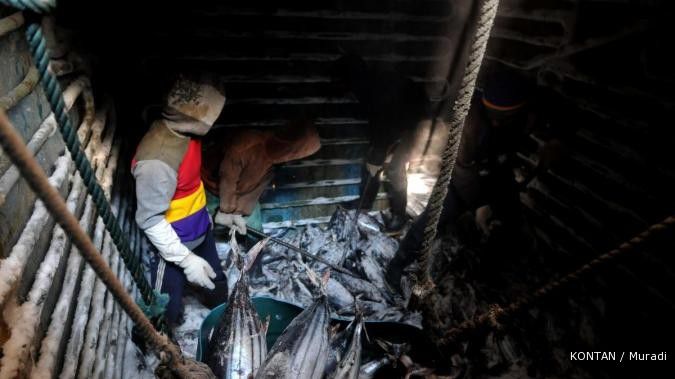JAKARTA. The government says it will likely revise its export target downward following deteriorating demand from traditional export destinations and impending commodity price corrections.
The nation’s export growth continued to slow in the first quarter with the total exports to the European Union declining 7.46 percent, exports to the US declining 6.17 percent and exports to South Korea down 9.19 percent.
“To tell you the truth, we are recalculating our US$230 billion export target. The trade minister has explicitly said that achieving last year’s $203 billion would still be considered as a good thing,” Deputy Trade Minister Bayu Krisnamurthi told reporters on Tuesday.
Bayu said a correction to the trade target would be logical, as most international finance institutions had predicted further deterioration of economic growth rates in most of the developed world.
“Even commodity prices have tended to decline, which is a direct result of lower global demand. I think this is something that we can’t ignore,” Bayu said.
Earlier this year, the World Trade Organization (WTO) estimated that the overall world trade volume would expand by only 3.8 percent this year.
It also predicted that exports from advanced economies would rise by 2.4 percent, lower than the 6.1 percent growth it forecast for developing economies.
Other nations, particularly the members of the G20, have also reported weakening exports, Bayu said.
He cited as examples the emerging economies of China, which reported 7.6 percent growth in exports in the first quarter, down from 26.4 percent in the same period last year, and Brazil, which also reported 7.6 percent growth, down from 30.6 percent.
Economists and executives alike have said that the government needed a more “realistic” export
target given global economic uncertainties.
Natsir Mansyur, the Indonesian Chamber of Commerce and Industry’s (Kadin) deputy chairman for deputy for trade, logistics and distribution, said on Tuesday that the government would have to revise its export target, as its continued reliance on traditional export markets such as the US and China left the nation vulnerable to external shocks, despite moves to boost exports to new markets.
Other internal factors, such as the recent imposition of export tax on 14 mineral commodities, would also likely push down exports this year, Natsir added.
The Finance Ministry is set to issue regulations this week that would levy a 20 percent export duty on 14 mineral commodities to avoid overexploitation of resources ahead a total export ban that would be implemented in 2014.
The minerals covered by the tax include antimony, bauxite, chromium, copper, gold, iron ore, iron sand, lead, manganese, molybdenum, nickel, platinum, silver and tin.
The total export value of the minerals is estimated at $10 billion a year.
“We continue to evaluate our trade target. Our main concern is that exports could continue to contribute significantly to GDP growth, which has been targeted at 6.5 percent this year,” Bayu said.
Despite recording negative growth in exports to several major economies, Indonesia’s total exports in the first quarter rose 6.93 percent to $48.53 billion, or about 24 percent of GDP, which expanded by 6.3 percent in the same period.
The International Monetary Fund projected that the global economy would grow by 3.5 percent this year, while emerging Asia such South Korea and Singapore, and developing nations, such as China, India, Indonesia, Thailand and Vietnam, would likely grow by 6.8 percent this year. (Linda Yulisman/ The Jakarta Post)
Govt likely to lower export target
May 09, 2012, 10.03 AM
/2012/05/09/1383512981.jpg)
ILUSTRASI. Uang rupiah. H-10, pembayaran THR PNS 2021 dimulai, simak daftar penerima dan nominalnya
Reporter: Edy Can
| Editor: Edy Can
Latest News
-
March 02, 2026, 10.49 AM
Bank Indonesia Monitoring Market Movements in Response to Conflict in Middle East
-
February 25, 2026, 08.28 PM
Inpex to Solicit Bids for Construction of Indonesia's Abadi LNG Project in Mid-2026
-
February 24, 2026, 03.38 PM
Eni to Reach Final Investment Decision for Indonesia Gas Projects Next Month
-
February 24, 2026, 01.00 PM
Asia Stocks Try to Steady after Wall Street Selloff Sims Mood
-
February 23, 2026, 04.50 PM
Wall Street Futures and Dollar Slide on Trump Tariff Tumult
-
February 23, 2026, 02.17 PM
Indonesia's Government Spending Jumps 26% in January 2026
-
February 23, 2026, 01.47 PM
Indonesia's Government Spending Jumps 26% in January
-
February 21, 2026, 06.00 AM
Indonesia's Pertamina to Maintain Bidding Process for US Energy Imports
-
February 20, 2026, 01.23 PM
Indonesia Secures 19% Tariff Deal with US, Palm Oil and Other Commodities Exempt










